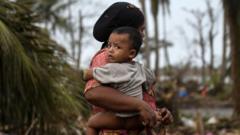Is Myanmar Facing a Starvation Crisis? UN Sounds the Alarm!

Understanding the Humanitarian Crisis in Rakhine State, Myanmar
The humanitarian crisis in Rakhine State, Myanmar, is reaching alarming levels as aid agencies issue dire warnings of starvation among its vulnerable populations. With the World Food Programme (WFP) making urgent appeals for donations, the situation paints a grim picture of suffering and desperation. The ongoing civil unrest, exacerbated by a military coup in 2021, has led to a massive displacement of people, particularly the Rohingya Muslims, who have been trapped in a cycle of violence and deprivation since 2012. As the WFP struggles to meet the skyrocketing needs of those displaced, the risk of a "full-blown disaster" looms large.
The Context of the Crisis
Rakhine State has been a focal point of ethnic tensions and violence for over a decade. The mass expulsion of Rohingya Muslims in 2017, which followed the communal violence of 2012, resulted in a significant humanitarian catastrophe. The Rohingya people, who already faced discrimination and marginalization, found themselves fleeing their homes and seeking refuge in overcrowded camps. In recent years, the situation has deteriorated further due to the military coup in 2021, which has destroyed the economy and exacerbated humanitarian needs across Myanmar.
The Current State of Food Insecurity
The WFP has reported a staggering 60% drop in its global funding this year, a sharp decline compared to the previous year. This reduction has severely limited the agency's capacity to provide food assistance to those in dire need. Currently, it can only support 20% of those facing severe food insecurity in Myanmar, a reality that highlights the urgent need for increased donations. In Rakhine, the humanitarian situation is particularly dire, with families resorting to desperate measures just to survive.
Desperate Measures and Heartbreaking Stories
Tragic stories from Rakhine State reveal the extent of suffering among its displaced populations. A heart-wrenching account of a father who added insecticide to his family's food in a moment of despair underscores the desperation faced by many families living in the Ohn Taw Kyi camp. His death, while tragic, was partially mitigated by the quick actions of his neighbors, who managed to save the lives of his wife and children. Such accounts are becoming increasingly common, with reports of families starving and resorting to extreme measures to alleviate their hunger.
The Impact of the Military Blockade
The military blockade in Rakhine has cut off trade and transport routes, exacerbating food shortages. Farmers can no longer reach markets to sell their crops, and the Rohingya people, who are barred from fishing in nearby waters, are left with few options for sustenance. The blockade has turned Sittwe, the capital of Rakhine State, into a besieged area, accessible only by sea and air. Consequently, the local economy has collapsed, leaving families without jobs or income.
Rising Costs and Diminishing Resources
- Prices for essential goods have increased fivefold.
- Most families are surviving on minimal resources, often resorting to eating boiled taro roots.
- The demand for conscription to fight against the Arakan Army adds to the economic burden.
The economic distress is palpable, as families struggle to make ends meet amidst rising inflation and dwindling resources. With no access to employment opportunities, many are left to navigate this treacherous landscape of survival.
The Role of International Aid Agencies
International aid agencies, such as the WFP, are facing significant challenges in delivering assistance to the affected populations. The military’s control over much of Rakhine State limits the ability of aid organizations to reach those in need. Even when funding is available, logistical barriers prevent aid from reaching the most vulnerable communities. The desperate need for increased international support cannot be overstated, as families continue to face overwhelming hardships.
Community Desperation and Social Tensions
As the situation deteriorates, social tensions are rising within the community. Families are experiencing increased levels of domestic violence, school dropouts, and even incidents of human trafficking as desperation sets in. The WFP has noted alarming signs of extreme economic distress across all communities in Rakhine, highlighting the urgent need for a concerted response to alleviate the suffering.
The Global Response and Funding Challenges
The international community’s response to the crisis has been lackluster. The WFP has pointed to the failure of donor countries to meet funding needs, which has left many families without the assistance they require. Notably, the decision by the previous U.S. administration to cut USAID funding by 87% has had a significant impact on the WFP’s ability to operate effectively. Last year, the U.S. provided nearly half of all government donations to the WFP, making the funding cuts particularly detrimental.
The Road Ahead: A Call for Action
A stark warning was issued by the UN last November, indicating a "famine in the making" in Rakhine State. With the WFP's funding shortfall persisting nine months later, the need for immediate action and support has never been more critical. The international community must rally to address the humanitarian crisis and provide the necessary resources to prevent further suffering and loss of life.
Conclusion: The Path to Recovery
The crisis in Rakhine State, Myanmar, serves as a reminder of the fragility of human life in the face of conflict and deprivation. As families continue to grapple with starvation and despair, it is imperative that the global community responds with compassion and urgency. Addressing the immediate needs of the affected populations must be a priority, but it is equally important to work towards long-term solutions that promote peace and stability in the region.
Frequently Asked Questions
What is the current humanitarian situation in Rakhine State?
The humanitarian situation in Rakhine State is critical, with aid agencies warning of starvation and severe food insecurity among displaced populations, particularly the Rohingya. Ongoing conflict and a military blockade have exacerbated the crisis.
How can individuals help those affected in Rakhine State?
Individuals can contribute to humanitarian efforts by donating to reputable organizations working in the region, such as the World Food Programme, which is actively responding to the crisis.
What are the long-term implications of the crisis in Rakhine State?
The long-term implications of the crisis may include continued displacement, social tensions, and economic instability. Addressing these issues will require a coordinated international response and a commitment to fostering peace and security in the region.
As we reflect on the pressing humanitarian needs in Rakhine State, it's vital to consider the role of the international community in addressing these challenges. How can we ensure that support reaches those who need it most? #RohingyaCrisis #HumanitarianAid #Myanmar
Published: 2025-08-15 09:49:12 | Category: technology



